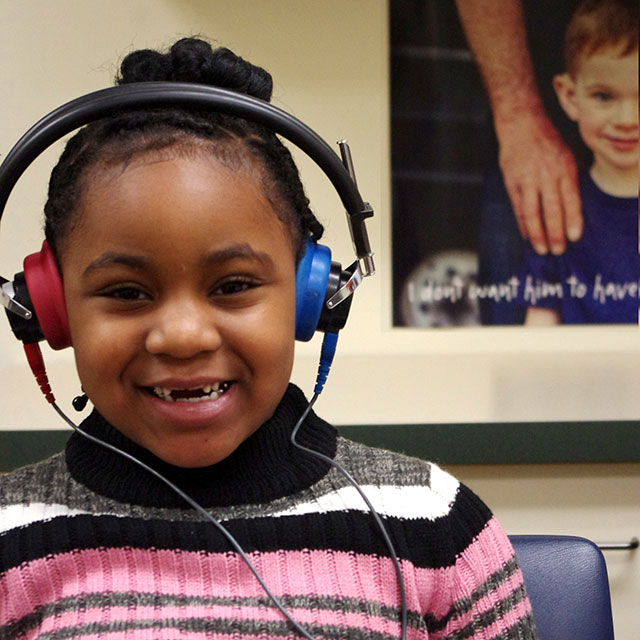Coming Out of a Lonely Place
Isolation. It’s what many of us have felt throughout 2020. Separated for long periods from co-workers, classmates, friends and family members; struggling to understand each other through poor phone and internet connections and behind face masks. It’s been a frustrating and often lonely place. A place those with hearing and speech impairments know all too well.
For 100 years now, the Center for Hearing and Speech has been helping to connect people with others through programs that empower communication. In its 100th year, the Center was awarded a YouthBridge YEP STL! Grant towards hearing and vision screenings for students in St. Louis Public Schools.
“This wasn’t how we expected to commemorate our 100th anniversary, but it is a rather fitting analogy to what our clients experience every day,” says Julie Erickson, Executive Director of the Center. “Our desire has been to open up the world to them, while also overcoming the barriers that may keep them from accessing the services they need.”
From its start, the Center has never turned away anyone for inability to pay, but Erickson says “access for all” has also meant bringing services to children and adults where they are. Those services include hearing evaluations, hearing aids and assistive listening devices, occupational hearing conservation programs, school hearing and vision screenings, and speech-language therapy. “In addition to offering cab vouchers for clients to our main and satellite clinics, we bring mobile hearing clinics to low-income neighborhoods across the region and provide therapy at 20 partner schools and child care facilities, because we know transportation is a huge barrier for many parents,” she says.
Last year alone, 14,000 students were screened through the Center – 3,700 identified with hearing or vision issues – and 471 children received speech-language therapy. Language disorders in children can lead to long-term problems affecting learning, behavior and social interaction, so a major focus is on identifying and addressing them pre-Kindergarten. “A child unable to pronounce their words or express their thoughts properly may either turn inward in embarrassment or act out in frustration,” says Erickson. “If we intervene early, we can shift the trajectory of their social, emotional and academic development.”
Students often show marked improvement after just six sessions, she says. For three-year-old Jontell, simple interventions that seemed like one-on-one play made a huge difference. After his mom, Zakia, noticed that he was not developing like the others in his preschool or engaging with them, she was at a loss to explain why. Learning of the Center, Zakia sought speech therapy for him, in which he learned more words and how to speak clearer while playing games, having books read to him and other simple activities that were really part of a specialized therapy plan.
“The greatest part was hearing the relief in mom’s voice when she began to see him talk and play with his classmates,” says Erickson. “She realized it wasn’t anything she or Jontell did wrong – they just needed some help. She says that now she can’t get him to stop talking!”
Jontell’s success – and the many others like him – motivates the Center’s therapists to carry a caseload of about 60 children each week during the school year. When the pandemic hit, it was critical to keep these lines of communication open, says Erickson. “In a week’s time, we had converted all sessions to teletherapy, thanks to technologies we already had in place.” Additionally, the Center has kept locations open with the option of curbside service and has provided tablets to some audiology clients for remote hearing aid repairs and consultations. School screenings continue in a limited capacity, and the mobile hearing clinic is operating on a no-contact basis, primarily for onsite hearing aid repairs.
“We’re not alone in feeling out of touch, but we’re working very hard to ensure our clients don’t feel that they are alone.”
If you would like to donate or have any questions about this organization, please contact Allison McDonald.
